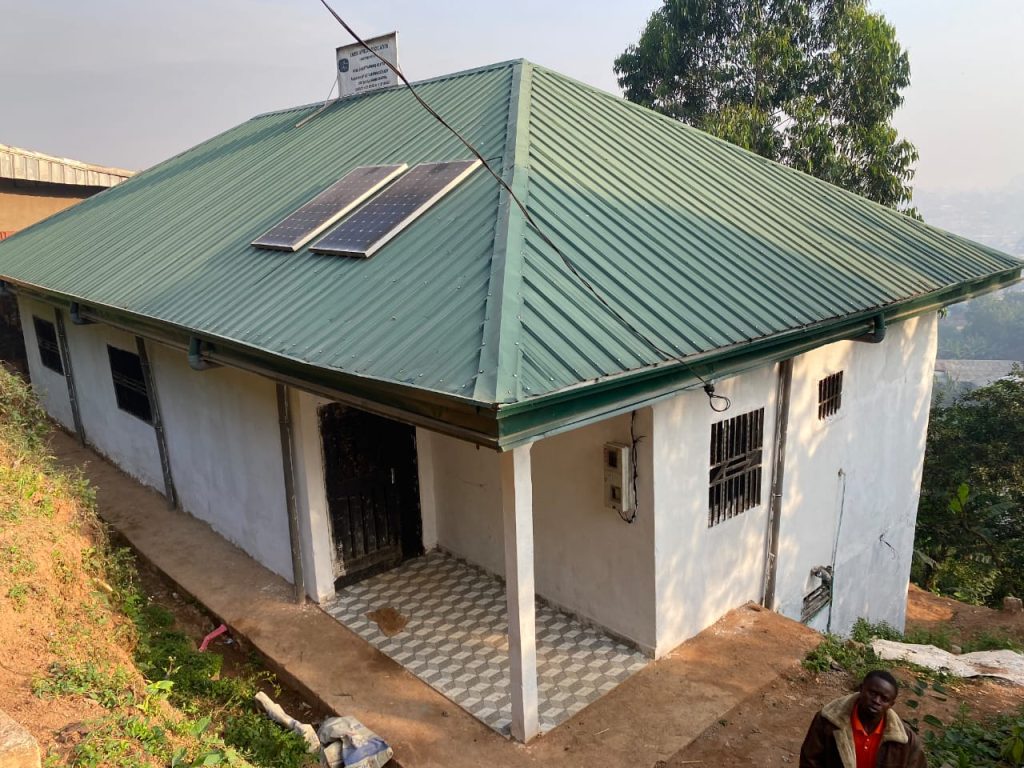What we do
The journey to establish a permanent home for peace in Bamenda began in early 2024 as a bold dream to move beyond a simple association and establish a world-class Academy. Our campus evolved from a challenging valley plot along Station Hill, generously donated by Mrs. Nduku Mercy Anne, into a physical testament of resilience. This first phase saw us transition from “idea” to “infrastructure,” successfully securing building permits and laying a foundation strong enough to carry our continental ambitions. Despite logistical complexities and rising material costs, we have successfully moved from foundation to roofing, and the skeleton of our dream is now a standing landmark. As we enter 2026, we are rounding up the construction of the Xhuma Africa Office Training Center, which serves as a functional hub for our “Peace Weavers.” This structure is a multi-purpose sanctuary featuring an auditorium, three restrooms, a dedicated library hall, four specialized offices, and a recording studio. We owe a profound debt of gratitude to the Kanthari Foundation Switzerland, Omprakash, and The Pollination Project for the funding and belief that turned this site into a sanctuary. Looking forward, our focus for 2026 is the final lap of furnishing the interiors to prepare the campus for accreditation and our first batch of resident students.

Our walls are up; now we need the tools. Help us furnish Xhuma Africa Training Center for our first batch of resident students.
Cluster A: Our Peace Academy (Pillars 1, 3, & 8)
Our Training Center is more than a building; it is a laboratory for national security. Here, youth parliamentarians analyze policy, and ‘Peace Weavers’ use our Recording Studio to produce documentaries that silence the guns.
Cluster B: Resilience & Human Dignity (Pillars 4, 5, & 6)
We address the root causes of violence—poverty and trauma. By providing clean water (WASH) and vocational training, we ensure that young people are too busy building their futures to be recruited into conflict.
Cluster C: Ecological & Digital Justice (Pillars 2 & 7)
We protect the ‘Sanctuary of Peace’ by cleaning our streets and our digital spaces. From picking up plastic in Bamenda to countering digital hate speech, we are safeguarding the world our youth will inherit.
Our Objective for social change
Empowering African youth to transition from victims of conflict to architects of sustainable peace and social change.
Peace Education as an Alternative to Violence
Peace education activities promote the knowledge, skills and attitudes that will help people either to prevent the occurrence of conflict, resolve conflicts peacefully, or create social conditions conducive to peace.
Core values of nonviolence and social justice are central to peace education. Nonviolence is manifested through values such as respect for human rights, freedom and trust. Social justice is realized by principles of equality, responsibility, and solidarity.
Our interventions include nonviolence, conflict resolution techniques, democracy, gender equality, human rights, environmental conservation, communication skills, coexistence, and tolerance of diversity.
Peace education can be delivered to people of all ages, in both formal and informal settings. At Xhuma Africa, our target group are young people.
The minds of young people are targeted and radicalized before recruitment as combatants in conflicts around the world. Young people are both actors and victims of societal violence. We are channeling the energy of young people to work for peace than violence. To create public dialogue different factions of society are often brought together in peace education programmed – these typically include civil society groups, schools, tribal leaders and the media. Yet due to the many areas covered by peace education, initiatives are primarily determined by culture and context, as well as by the projects’ scopes and objectives.
Peace education and peacebuilding are therefore intrinsically linked. The UN’s actions for peacebuilding include education as one of its principle components. For peacebuilding initiatives to remain sustainable it is vital that attitudes towards war and violence are transformed and translated into long-term behavioral change which seek alternative solutions to armed conflict.
Travel
Our engagements in peacebuilding activities
A small river named Duden flows by their place and supplies it with the necessary regelialia. It is a paradise
Travel
